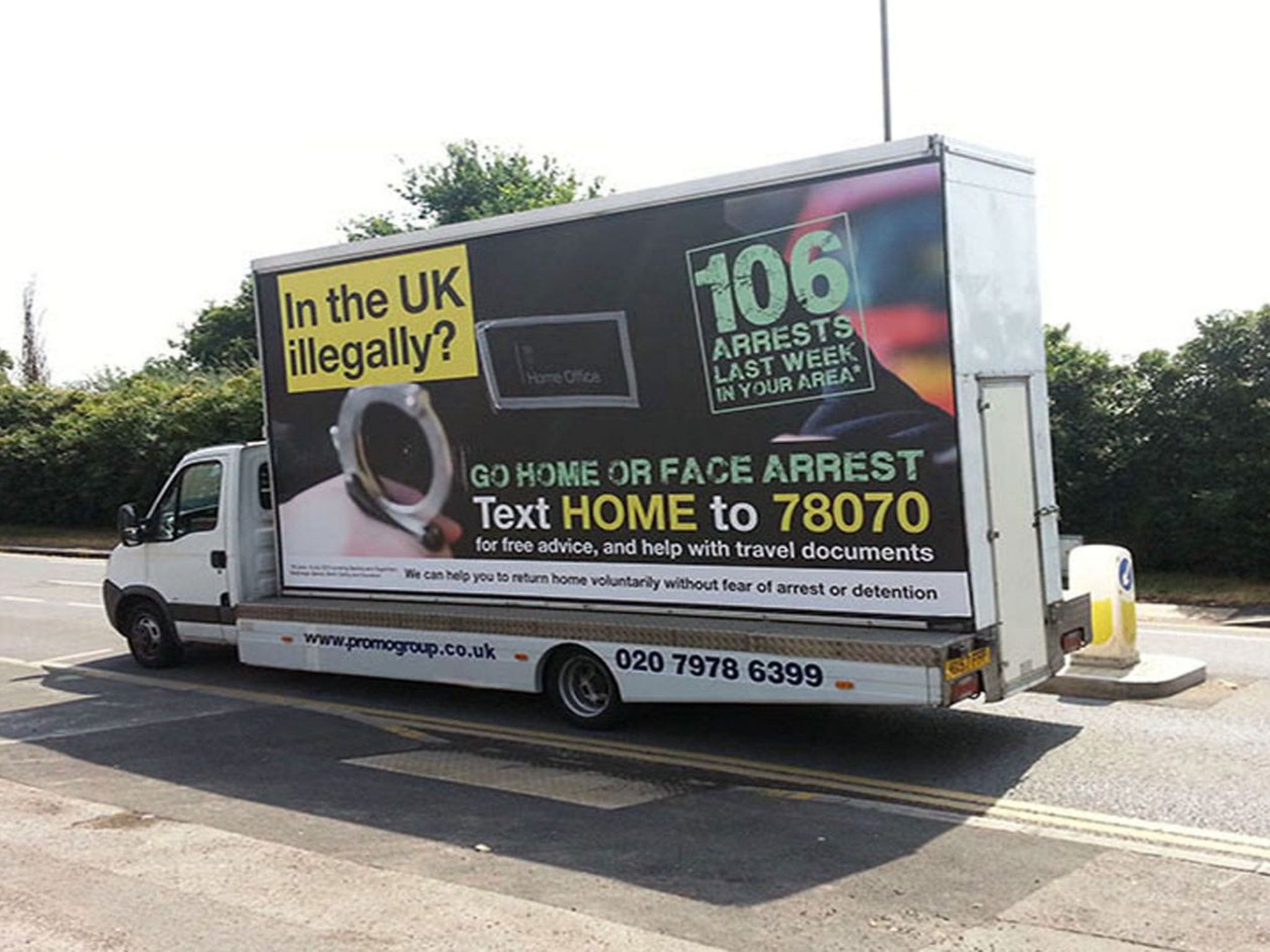Immigration policy led to 'new forms of racism', says new study
Policies such as the use of billboard vans warning illegal immigrants to 'go home or face arrest' has led to legal migrants being subjected to racial prejudice

Your support helps us to tell the story
From reproductive rights to climate change to Big Tech, The Independent is on the ground when the story is developing. Whether it's investigating the financials of Elon Musk's pro-Trump PAC or producing our latest documentary, 'The A Word', which shines a light on the American women fighting for reproductive rights, we know how important it is to parse out the facts from the messaging.
At such a critical moment in US history, we need reporters on the ground. Your donation allows us to keep sending journalists to speak to both sides of the story.
The Independent is trusted by Americans across the entire political spectrum. And unlike many other quality news outlets, we choose not to lock Americans out of our reporting and analysis with paywalls. We believe quality journalism should be available to everyone, paid for by those who can afford it.
Your support makes all the difference.The Government’s tough rhetoric on immigration is alienating migrant communities and causing “new forms of racism” to break out across the country, a major study will warn today.
Controversial policies such as the use of billboard vans warning illegal immigrants to “go home or face arrest” and the posting of pictures on Twitter showing suspects being led away by officials has led to legal migrants being subjected to racial prejudice, it concluded.
Different migrant groups have become increasingly suspicious of one another, with hostility breaking out between asylum seekers, refugees and Eastern Europeans. Some migrants reported ethnic minority British citizens telling them to “go home”.
One Bradford resident told researchers: “People can’t tell who is legal or illegal and they make judgements based on your appearance. Sometimes that changes when they hear your accent.”
The disturbing findings come in the wake of official statistics showing that net migration to the UK has risen to 298,000 – around 50,000 higher than when David Cameron became Prime Minister. The Conservatives previously promised to reduce it to below 100,000.
While it has failed to reduce the number of people entering the country, the Government’s hardened stance on the issue has meant that it is now “acceptable” for people to be openly anti-immigration – a viewpoint which can easily cross the line into racism, the researchers said.
Some legal migrants have been so intimidated by the Government’s messages that they are “scared to be politically engaged” in case their right to remain in the UK is threatened, the researchers said. Even “established minorities” were found to be increasingly reluctant to take part in political activism.
The study, which drew on an Ipsos MORI survey of more than 2,400 people, was launched in the wake of controversy surrounding the deployment of vans instructing illegal immigrants to “go home or face arrest”, which toured six London boroughs in 2013. The pilot scheme was later ditched by the Home Office, which claimed it led to 11 people leaving the country.
Some of those polled believed that the adverts had been organised by far-right groups such as the English Defence League, rather than the Government. One Birmingham resident told researchers: “It’s a group of people who don’t want foreigners in their country. I think it’s the EDL – they are telling us that they don’t like us, they don’t want us, we should go.”
Academics from seven different universities around the UK contributed to the 18-month project, Mapping Immigration Controversy, which received funding from the Economic and Social Research Council. Its findings will be presented at a briefing in London today.
Lead researcher Dr Hannah Jones, of the University of Warwick, said the study’s findings undermined the Government’s statements about the importance of “British values” such as tolerance and respect, as its tough talk on immigration made new arrivals feel unwelcome and threatened.
“We had examples of people saying that when they were in Afghanistan, or whichever country they came from, they believed that Britain was a place of tolerance and a place of safety. But now they say it doesn’t feel like that,” she said.
The Government campaigns had also created “resentment between different migrant groups”, she added, as well as leading to people “being treated as though they were illegal immigrants” because of what they looked like.
“It’s not necessarily people being in the traditional racist mode of hating black people or thinking black people are inferior, but seeing people of colour as potential immigrants and not belonging. In that sense it’s a new form of racism,” she said.
Labour's David Hanson MP, the shadow Minister for Immigration, said: "The Home Secretary was worried about the Tories being called 'the nasty party' but the disgraceful 'go home' vans were a clear example of the awful immigration policies and rhetoric that's been the hallmark of this Coalition Government.
"These findings are extremely worrying and should serve as a reminder to the government of the impact of their careless use of divisive rhetoric. Over centuries Britain has benefited from the energy, ideas, hard work and investment of people coming to live here from abroad.
"Immigration will continue to be important to Britain, but it needs to be managed and controlled so the system is fair. We need strong borders, and for rules to be enforced, but we do not need the government stirring up community division in the rhetoric they use and the policies they pursue."
The Home Office declined to comment when contacted by The Independent.
Join our commenting forum
Join thought-provoking conversations, follow other Independent readers and see their replies
Comments